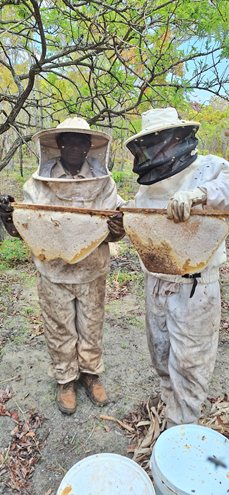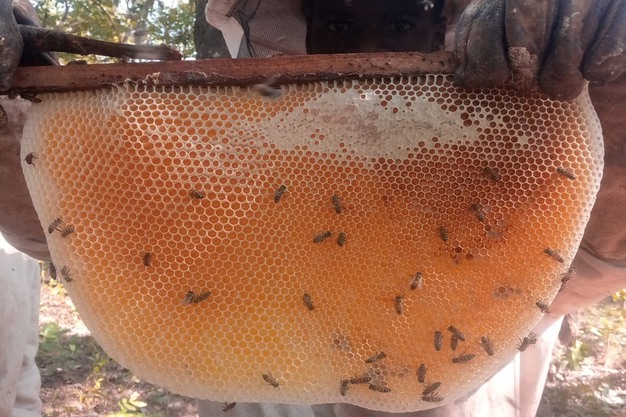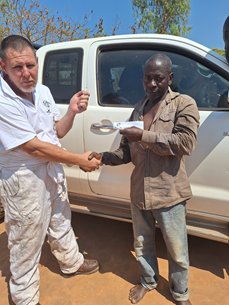 Heinrich van der Merwe is a beekeeper in Gurué, in Mozambique's Zambezia Province. He hasn't left home for a few weeks since leaving the beekeeping project on Mount Mabu where he's helping to set up 700 beehives in 9,000 hectares of untouched forest when he got caught up in the impromptu roadblocks set up across the country in protest at an allegedly stolen election.
Heinrich van der Merwe is a beekeeper in Gurué, in Mozambique's Zambezia Province. He hasn't left home for a few weeks since leaving the beekeeping project on Mount Mabu where he's helping to set up 700 beehives in 9,000 hectares of untouched forest when he got caught up in the impromptu roadblocks set up across the country in protest at an allegedly stolen election.
Right: beekeepers in Zambezia Province
"Nothing is happening in Mozambique: nobody's driving around. I've stopped my technicians from moving around, and everywhere roads are blocked. The national highway the N1 is blocked from the north to the south," he says.
The southern border post with South Africa is intermittently closed because of unrest in nearby Ressano Garcia.
A banana exporter says they're expecting the border to re-open after Christmas, perhaps by Friday, to allow the flow of Mozambican bananas into South Africa.
The feeling among most Mozambicans is that the five-year-old Optimist Party for the Development of Mozambique was the victor of the general election in early October and that egregious electoral fraud was committed by Frelimo, the erstwhile liberation movement-turned-political party that will have been in power for fifty consecutive years by 2025.
Yesterday, Mozambique's Constitutional Court, at last, released its judgment on the contentious results: it supports the Frelimo party and rejects the allegations of electoral fraud, leveled also by external election observers.
"Protestors aim to render the country ungovernable to force the government to accept the real election results," Van der Merwe explains. Opposition leader Venâncio Mondlane's lawyer and the party's representative died in a hail of bullets in the capital shortly after the elections. They'd been compiling a dossier of evidence that Frelimo rigged the election.
Many instances of arson are reported as citizens vent their fury on the government. "It is a day of unprecedented turmoil, destruction, and a resounding cry for justice in Mozambique," Prof Adriano Nuvunga, director of the Center for Democracy and Human Rights in Mozambique wrote yesterday. "Across the country, communities have risen in protest, and the devastation speaks volumes about the deep fractures in our nation."
Prof Nuvunga, who is also the chair of the Southern Africa Human Rights Defenders Network, says that political tension is escalating because the government refuses political dialogue. "The future of Mozambique hangs in the balance. Dialogue is not a weakness. It is courage. The destruction of our nation cannot be the legacy we leave for future generations."
Natural gas buys Frelimo's power
Frelimo's position has in recent years been entrenched by the discovery of the offshore gas fields along the coast of northern Mozambique, bringing stupendous amounts of money into the country. Various news outlets have reported that, until October 2024, the exports from the Coral Sul FLNG offshore platform totalled almost 900 million euros, Van der Merwe says. According to Venâncio Mondlane, exiled opposition leader, this gas money only finds its way into the pockets of the Frelimo patronage network.
"I occasionally followed Mondlane when he was an opposition member of Parliament, and he frequently exposed frailties and lack of accountability in the government. Now he frequently releases talks on YouTube which I regularly listen to," Van der Merwe says. It is unknown where exactly Mondlane is in exile.
"It helps that I speak fluent Portuguese, so I can follow the politics and current affairs in the country. Mondlane really wants to bring about change in the country that will benefit ordinary citizens. For instance, it is very normal for public servants to not receive salaries for several months."
Meanwhile, the taxes on the revenues of Mozambique's offshore gas which has drawn all the major names in exploration (Total, Exxon Mobil, Chevron, BP, as well as Japan's Mitsui, Malaysia's Petronas, and China's CNPC) do not trickle back into the domestic economy.
Apiculture supports people and environment

"We turn the forests into a source of income for the local people"
Van der Merwe previously lived and worked in Zimbabwe as an agronomist for Omnia Fertilizer, until all his clients had lost their farms. He'd already been importing Mozambique's famous seafood to Zimbabwe, and in 2000 decided to move to Mozambique. Today he develops apiculture in Mozambique, supporting a thousand rural beekeepers with full-time technical assistance.
Today he develops apiculture in Mozambique, supporting a thousand rural beekeepers with full-time technical assistance.
"The whole idea is to conserve natural bush because everywhere natural forests are being chopped down and burned for charcoal. So we turn the forests into a source of income for the local people by providing them with the skills and support to make a living from beekeeping, whilst guaranteeing a market for all the honey they produce."
Right: Heinrich van der Merwe with a beekeeper whom he has trained
He guarantees a market for all the honey produced by these beekeepers.
"There is very good demand for honey in northern Mozambique. I distribute all of the honey from the local beekeepers to cities like Nampula. The Mozambican market has the capacity to absorb about 400 tonnes of honey a year, currently, Mozambique produces 20% to 30% of that."
But he is very worried whether Mozambique, his adopted home, can pull back from the brink.
For more information:
Heinrich van der Merwe
AGRI-Mel Limitada
Email: [email protected]
